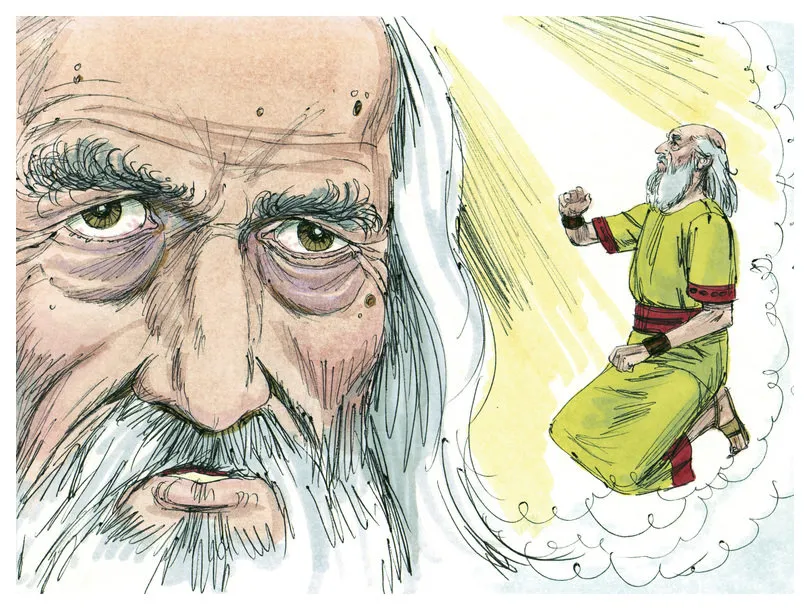The Bible is replete with amazing stories of people who made history through their faith, character, and actions. Among these many tales is the story of Gehazi, a servant who followed the prophet Elisha. In this article, we explore the tale of Gehazi, his service to Elisha, the story of Naaman, his greed and subsequent punishment, his repentance and forgiveness, and the lessons we can learn from his story. If you want to discover more about this lesser-known character from the Bible, read on!
Who Was Gehazi in the Bible?
You may have heard of Elisha, the prophet, and his many miraculous acts in the Old Testament. But have you ever wondered about his servant, Gehazi? Who was he, and what role did he play in Elisha’s ministry?

Gehazi and His Service to Elisha
Gehazi was Elisha’s most trusted servant and was always by his side. He played an important role in Elisha’s ministry, helping him as he went from town to town, performing miracles and spreading God’s message. Gehazi was a faithful and obedient servant, and Elisha trusted him completely.
The Story of Naaman and Gehazi’s Greed
One of the most well-known stories involving Gehazi is the story of Naaman the Syrian. Naaman was a powerful general in Syria who suffered from leprosy. Elisha miraculously healed Naaman, and in return, Naaman offered Elisha a gift of silver and clothing. Elisha refused, but Gehazi coveted the gifts and secretly followed Naaman. He lied to Naaman and took the offering for himself.

Gehazi’s Sin and Punishment
Elisha was a man of God and directed by the Lord. After finding out about Gehazi’s deceitful actions, Elisha confronted Gehazi, and Gehazi admitted to his sin. As a result, Elisha declared that the leprosy that Naaman was healed from would now come upon Gehazi and his descendants forever.
Gehazi’s Repentance and Forgiveness
Despite the consequences of his actions, Gehazi did not give up on God. He realized the gravity of his sins and repented. Although he still suffered the punishment for his wrongdoing, it’s important to note that God forgave him.
Lessons Learned from Gehazi’s Life
Gehazi’s story teaches us some valuable lessons. Firstly, greed and deceit have severe consequences, as seen with Gehazi’s punishment. It reminds us to focus on God and live honestly. Additionally, Gehazi’s repentance and God’s forgiveness show us that no matter how severe our mistakes, we can always turn to God and receive forgiveness.
To sum up, Gehazi was Elisha’s servant, who allowed greed to consume him, leading to sin and punishment. However, he also experienced the redemption that comes with repentance, which serves as a reminder of God’s grace. We can learn from Gehazi’s story by avoiding his mistakes and following God’s path with faith, trust, and obedience.
Gehazi and His Service to Elisha
Gehazi was a servant of Elisha, who was also a prophet in the Bible’s Old Testament. He is first mentioned in 2 Kings chapter 4, where Elisha performs miracles and helps people in need. Gehazi was always there to assist Elisha in his work, serving as his right-hand man.
As a servant, Gehazi had many responsibilities. He was responsible for carrying his master’s staff, going on errands, and preparing meals for him. But Gehazi was not just a servant; he was also a disciple of Elisha. He learned from him, watched him perform miracles, and witnessed his unwavering faith in God.
Gehazi was a loyal and faithful servant but unfortunately fell victim to greed and deceit, which caused tragic consequences.
The Story of Naaman and Gehazi’s Greed
The story of Naaman is one of the most famous stories in the Old Testament. Naaman, a Syrian general, suffered from leprosy, which was a deadly and incurable disease at that time. He was advised by his wife’s servant to seek the help of Elisha, a powerful prophet in Israel who could heal him. Naaman went to Israel and asked Elisha to heal him of his leprosy.
Elisha instructed Naaman to go wash himself seven times in the Jordan River, and Naaman was skeptical. He thought it was too simple of a solution to his problem. However, he followed Elisha’s instructions, and he was healed! Naaman was overjoyed and wanted to reward Elisha for his help. But here is where Gehazi comes in.

Gehazi, Elisha’s servant, coveted the gifts that Naaman had brought for Elisha. So, without Elisha’s knowledge, Gehazi chased Naaman and lied, saying that Elisha needed the gifts. Naaman believed him and gave Gehazi the gifts. When Gehazi returned home, Elisha confronted him, and he was punished by Elisha for his deceit.
This story is a clear example of how greed can lead to deceit and consequences that follow. Gehazi’s greed blinded him to the fact that he was a servant of Elisha, a man of God, and he let his greed take control of his actions. He suffered a great loss of reputation, his master’s trust, and dignity as a servant of God.
Lessons Learned from Gehazi’s Life:
Greed leads to deceit and shame: Gehazi’s greed led him to lie and covet something that wasn’t rightfully his. In the end, he lost his reputation, trust, and even suffered from leprosy, just like Naaman did.
Be content with what you have: Gehazi was a servant of Elisha, which was a privilege in itself. He had a great role in serving a prophet of God, yet he still coveted Naaman’s gifts. We should be content and grateful for what we have in life, and not let greed cloud our judgment.
Repentance and humility lead to redemption: Gehazi repented of his sin and recognized his mistake. He humbled himself and accepted his punishment. In the end, Elisha forgave Gehazi, and he was redeemed. This teaches us that we can always turn back to God, no matter what we have done.
In conclusion, Gehazi’s story is a clear example of how greed can lead to deceit, consequences, loss, shame, and even leprosy. However, it’s also a story of how we can learn from our mistakes, repent, and experience forgiveness, redemption, and humility.
Gehazi’s Sin and Punishment
Unfortunately, Gehazi’s story takes a significant turn for the worse when he chooses to give into greed and deceit.
After Naaman is healed of his leprosy by the power of God through Elisha, Gehazi decides to chase after Naaman and lie to him, telling him that Elisha had sent him for a gift of silver and clothing. Naaman, overjoyed and grateful for his healing, gives Gehazi double what he asked for. But when Gehazi returns to Elisha and is confronted about his deceit, he denies it. Elisha, who had been given supernatural knowledge of Gehazi’s actions, pronounces a curse on him, stating that the leprosy which had just been lifted from Naaman would now cling to Gehazi and his descendants forever.
Gehazi’s sin and lack of integrity brought about severe consequences that affected not just him, but his family as well. This serves as a warning to us that our actions have consequences and that sin in our lives can cause us to lose much more than we think. The Bible tells us that the wages of sin is death, but the gift of God is eternal life through Jesus Christ our Lord (Romans 6:23). As Christians, we are called to live lives that are pleasing to God and to strive for righteousness.
But even in the midst of Gehazi’s punishment, there is still hope for him. The Bible teaches us that God is loving and merciful, and that if we genuinely repent of our sins and turn to Him, He will forgive us and restore us. Gehazi’s story reminds us that no matter how far we may have fallen, God is always ready and willing to extend forgiveness and a second chance. It is up to us to turn to Him in humility and repentance.
As we reflect on Gehazi’s life, let us learn the lessons that his story teaches us. Let us strive for integrity and truthfulness in all of our actions and seek to honor God in everything we do. And let us never forget that the consequences of our sin can be severe, but that God’s love and grace are always available to us.
Gehazi’s Repentance and Forgiveness

In the previous section, we explored how Gehazi’s greed and deceit resulted in severe consequences. However, the story does not end there. After being struck with leprosy, Gehazi was consumed with shame and regret. He realized the gravity of his sin and the pain it had caused to others.
Despite his wrongdoing, Gehazi did not lose hope. He sought repentance and forgiveness from God and Elisha. His actions exemplify the power of redemption and second chances. Gehazi’s journey is a reminder that no matter how far one may have strayed, it is never too late to turn back to God and seek forgiveness.
Here are some lessons we can learn from Gehazi’s repentance and forgiveness:
Humility is key: Gehazi humbled himself and acknowledged his wrongdoing. Admitting our mistakes can be difficult, but it is an essential step towards repentance and forgiveness.
God is merciful: Despite the gravity of Gehazi’s sin, God showed mercy towards him. This reinforces the notion that God is loving and forgiving, and we can always turn to Him in times of need.
Repentance leads to restoration: Gehazi’s repentance and seeking forgiveness led to his healing. Likewise, when we repent and seek forgiveness, we can experience restoration in our relationship with God and others.
Consequences of sin can be severe: Gehazi’s story reminds us that there are consequences for our actions, and sin can result in severe punishment. Therefore, we should strive to lead a life that glorifies God and stays away from sin.
Forgiveness is possible: Elisha forgave Gehazi, despite his deceit and greed. This highlights the power of forgiveness and the importance of extending it to others.
As we reflect on Gehazi’s story, we can gain valuable insights into the power of repentance and forgiveness. Let us learn from his mistakes while also recognizing that redemption is possible through God’s love and grace.
Lessons Learned from Gehazi’s Life
Gehazi’s story may be one filled with greed, deceit, and punishment, but it’s also a story of redemption and second chances. As we read about his life in the Old Testament, we can take away valuable lessons for our own lives.

First and foremost, Gehazi’s story warns us against the dangers of greed. Gehazi’s desire for Naaman’s possessions led him down a path of deceit and sin, ultimately resulting in his punishment and disgrace. We must remember to prioritize our values and avoid becoming consumed by material possessions.
Another critical lesson is the importance of repentance and forgiveness. Even in the midst of his sin, Gehazi had the opportunity to turn towards God and ask for forgiveness. We too must seek to make amends when we fall short, and trust in God’s mercy and grace to guide us on a path of redemption.
Gehazi’s story also highlights the consequences of disobedience and lack of trust in authority. As a servant to Elisha, Gehazi’s deceitful actions not only resulted in punishment but also strained his relationship with his master. We must learn to trust and obey those in authority over us, whether it be our parents, teachers, or spiritual leaders.
Lastly, Gehazi’s story reminds us of the power of humility. After his sin, Gehazi was left alone and ashamed, forced to confront the consequences of his actions. It was only through his recognition of his wrongdoing and humble submission to Elisha that he was able to find redemption. We too must practice humility as we navigate the ups and downs of life.
In conclusion, Gehazi’s story may seem like a cautionary tale, but it also offers us valuable life lessons. From greed to repentance, obedience to humility, Gehazi’s life serves as a reminder of the power of faith, forgiveness, and second chances.














